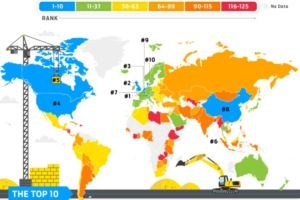News
Danish News Round-Up: Denmark in the top ten for construction workers
This article is more than 4 years old.
Elsewhere, look outside if you’re in the capital, as it’s probably still snowing. Expect to wake up to a blanket on Thursday, but in the meantime … tomorrow will be horrid!

Blue areas are the best for these blue collar workers! (image: Workwear guru)
Denmark ranks as the world’s tenth best country for construction workers, according to a new Workwear guru study.
The report took into account factors such as average salaries, the cost of living, and safety in the workplace.
Construction workers in Denmark got the sixth highest annual salary at 45,295 US dollars.
But Denmark lost points for have the second highest cost of living in the top ten, behind only Switzerland, and a higher accident incidence rate higher than 14 of the top 15.
Yemen ranked last
Above Denmark in the rankings were Switzerland, the UK, Belgium, the US, Canada, Singapore, Luxembourg, China and the Netherlands.
But it did finish above both Norway (14) and Sweden (27).
The highest average salary for construction workers among all countries worldwide is in Switzerland at $79,159 while the lowest average salary is in Uzbekistan at $875.
The bottom five in the rankings were the Dominican Republic, Myanmar, which has the worst incidence rate, Uzbekistan, Ethiopia and last-placed Yemen.
World Cup host Qatar was not included in the survey.
Caution in traffic urged as snow, sleet and rain fall down on Denmark
Severe winter weather has hit parts of Denmark over the last 24 hours, causing minor traffic accidents. The Road Directorate is calling citizens to be cautious on the roads, as worse weather conditions are expected on Wednesday, which promises to be extremely wet. Some 26 mm, mostly rain but some sleet, has been forecast for the capital area, with temperatures not expected to climb above 3 degrees. Snow has just fallen in the centre of Copenhagen in the past hour, and providing the ground is not too wet, the capital can expect to wake up to a blanket on Thursday morning.
Non-vaccinated people accounting for the majority
Non-vaccinated young people are filling the majority of hospital beds set aside for COVID-19 sufferers, according to TV2. On a visit to the capital-based Hvidovre Hospital, they accounted for seven out of every ten patients with corona. According to Dr Oli Dalsgard, their hospitalisation was easily avoided. “As a healthcare professional and as a human being, it is deeply frustrating because you know that people might have avoided this. It is very sad,” he told TV2.
Denmark introduces new doping test
Anti Doping Denmark has created a new device to test the blood of sports people, reports DR. The device takes a drop of blood from the shoulder of an athlete. Dissimilar to other commonly used methods that take urine or blood samples, the practice is quicker and friendlier.
Vestas hit by ransomware attack
Danish wind turbine giant Vestas has confirmed to DR that cybercriminals are blackmailing the company for money. Previously, the company had confirmed being cyber-attacked. Vestas communications manager Anders Riis confirmed: “Vestas has been exposed to a so-called ransomware attack, and we are working with our customers, employees and other stakeholders to handle the situation.” The company does not want to disclose which group is behind the attack.
Authorities investigating nine suspected cases of Omikron
Two cases of the Omikron variant have been found in travellers from South Africa, and there are currently a further nine suspected cases on Danish soil, according to Statens Serum Institut. Meanwhile, the South African Foreign Ministry has told BBC that it is being unfairly punished, when it should be applauded for detecting the Omicron variant.
TV2 apologies for sexism within
A new TV2 documentary has exposes widespread sexism at the TV broadcaster. TV2 has apologises for the past failures exposed by ‘Metoo: Sexism behind the screen’, in which eleven current and former employees share their experiences.
New wolf couple at large
A lone female wolf has most likely been joined by a male wolf at Skjern in southwestern Jutland, according to the Environmental Protection Agency. Since January last year, the Danish-born female wolf has lived alone in the area.










































